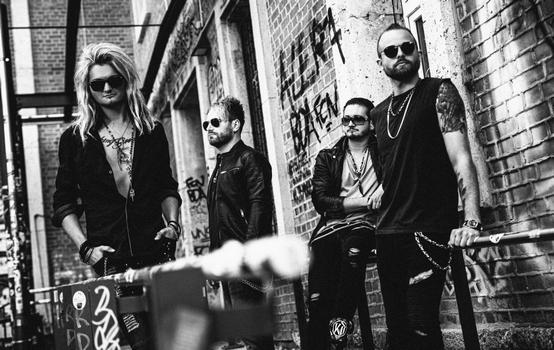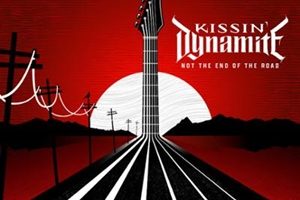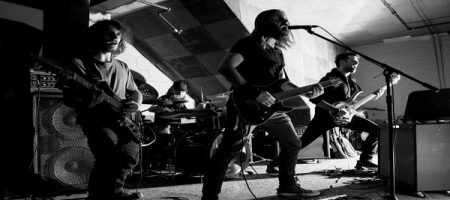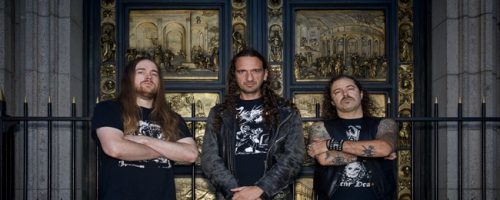Kissin’ Dynamite – Lovin’ the Road
Sunday, 9th January 2022
Embracing a fun-loving sound that contains lots of 80’s melodic hard rock/metal traditions, Kissin’ Dynamite are one of the younger bands from Germany that have ascended the ranks for prime-time touring and festival opportunities. Hard to believe that they are now up to their seventh studio album with Not the End of the Road. Taking the time to issue a record that touches on everything from anthems to rockers to ballads, it’s another outing where the listeners can truly feel the hooks, the catchiness, the infectious qualities that make you want to sing, scream, or shout along to your favorites.
We reached out to vocalist Hannes Braun recently through Zoom and had a delightful conversation catching up on the new release, the drummer change, video work, creating your own road to success in this tough music industry, and his outlook on producing plus lots of stadium rock/80’s talk.
Dead Rhetoric: Not the End of the Road is the latest Kissin’ Dynamite album – and your first for your latest label Napalm Records. How did the material and recordings go this time around – and did the longer break off the road with the pandemic allow you to dig deeper and focus on the smaller details this time around?
Hannes Braun: You know, well it’s been two tough years. And that’s quite obvious due to the pandemic, which hit us musicians the hardest probably of all people. Because we were the first to not be allowed to do what we do, and we are going to be the last to really do things how we used to do things before the pandemic. So, it gave us a lot of time, and forced us to think about everything. We were not sitting still and waiting until the pandemic was over, we immediately started writing songs when the first lockdown came.
It’s been quite a journey to where we are now because in these crazy days and times, emotions were like a rollercoaster. Sometimes you had those moments where you were totally devastated, frustrated, and you couldn’t see the light at the end of the tunnel. Weeks later, when the lockdown was over and things seemed to open up, euphoria was coming to mind. That’s the reason the album sounds like how it sounds, it sounds a little bit poetic but I think this album represents life itself. Because of this rollercoaster. There are songs that have this impact of looking optimistically in the future, with lots of strength and power, like “Not the End of the Road” – and also songs where you can feel the depression like “Scars” for example. It was a natural process, and a long process. This is the album that has taken us the longest to make in our career.
Dead Rhetoric: You also went through your first lineup change as a band with new drummer Sebastian Berg replacing Andreas Schnitzer. How did you take this change personally, and what does Sebastian bring to the table that may be different or special for Kissin’ Dynamite?
Braun: Yeah, well – we didn’t take it personal that Andi left the band. It’s just kind of, didn’t feel comfortable anymore. His aims, ideas, and tastes maybe changed. We all respected his decision, you cannot imagine it like you throw a bottle at someone’s head, you call him asshole, and he is out of the band. It was a super long process that you don’t even recognize, because it slightly changes all the time. At some point, the changes that have been taking place are just too big. Then you have to make a decision – do I stay in the band, or don’t I? Well, he decided to leave. We were quite sad and felt another bit of sadness. We had to deal with the question of how to continue in the band. This is not the end for us – and by the way, this is the reason why we wrote that song, “Not the End of the Road”. We have, and always have been, a touring band. We write songs to show them live.
We decided to continue with a new drummer, but we were going to take it slow, because we may not find a great drummer and an amazing human being in the next four months when the next set of shows would happen. If we don’t find somebody quick, we would go with a session drummer for those shows. We didn’t have to do that. In the first audition, Sebastian was a part of that. We had almost seventy drummers who tried out. Out of those we picked eight, and in those eight there was Sebastian. He had this great energy, we invited him for a second and real long rehearsal again. We hooked him up with a lot of beers afterwards to find out if he’s a really cool guy, and he was. And the decision was pretty clear. With every photo shoot, video shoot, and gig that we play, we feel more and more this band feeling that we haven’t felt in a long time.
Dead Rhetoric: Tell us about the video work you’ve done so far for the record. Do you believe it’s been very important in building the brand of the band and injecting more of your personality with these visual clips – and what have been some of your favorites in this regard over the years?
Braun: First of all, I think so yes. Delivering good music, that’s the least that a band should do. I think we are doing that, I can say that with all my self-esteem. To give things another dimension is to deliver also good pictures, good videos. It’s just another way to transport and address the emotion that’s stuck in the songs. I really think nowadays you cannot produce less videos – you should put out what you can put out.
Since all the fans, they are taking use of YouTube and social media, this is the new way how to do it I guess. My favorite video for this new album is “Yoko Ono”. I think it has some art feelings even, the video producer dealt with some things that the real Yoko Ono did, like the begging and stuff. We tried to pay tribute to Yoko, with an ironic smile. “What Goes Up” I really like as well. We shot that in Spain, we had this luxury villa we booked ourselves in with lots of girls which are friends of Kissin’ Dynamite. We flew them in from Germany to Spain and we had three good days. What you see in the video is basically true. That was a really cool experience and I love the final video of that.
Dead Rhetoric: Now seven studio albums into the Kissin’ Dynamite career, how would you assess yourselves as songwriters and musicians? Where do you think you’ve seen the biggest growth as people when you knew you were making more of an impact and footprint on the scene?
Braun: That’s a tough question. First of all, when we started with the first album we were a school band. We were fifteen, sixteen years old, we were paying tribute to our heroes like The Scorpions, AC/DC, Iron Maiden, and quite different amounts of music. Maiden sounds way different than AC/DC, and you could hear that on the first record. We didn’t really have a style, our own trademark style. And that is quite logical when you are that young. We experimented to find who we really are. There are more metallic days with Addicted to Metal, and then sometimes we would look into electronic elements with Megalomania. I don’t regret any album, because it was super necessary and important to find the essence of Kissin’ Dynamite. I think we found that with the last album Ecstasy, and Not the End of the Road starts where that album ends. It’s not so much of a style change.
When it comes to personal growth, I think we have achieved that with this album. Because we really deal with crisis, the pandemic, depression. We also had to deal with big changes outside of our comfort zone. It’s not our comfort zone at all – we came back from tour in 2019 after almost one hundred shows and then it felt like we were driving at two hundred kilometers per hour against a steady wall. You really have to start again. I think every emotion about that is a part of this album.
Dead Rhetoric: What’s most enjoyable to you when it comes to the band – working on new material and the studio sessions, or playing live across stages all over the world? Or do you find equal enjoyment in both processes for their own unique and different circumstances?
Braun: I love both. Otherwise, I wouldn’t do it. If I had to choose between the two, then I definitely would go with creating music. Sitting in the studio, I call it the tunnel. If I am sitting in my studio, I forget about both time and space, that’s my little simple moment. The best possible emotion that I can feel in my life. I enjoy if there (are) no outer sphere disturbing moments. Of course, it would be boring if you only sit in the studio year after year, so I enjoy bringing these songs to life on stage with an audience. It’s the change that makes it interesting. To go on tour for a year, and then come back home for a couple of years in the studio – that’s a balance to me that I wouldn’t want to miss either (aspect) of it.
Dead Rhetoric: Now that you are nearing the end of your twenties, what would you say have been some of the biggest learning curves you’ve experienced as a musician that you have handled and grown stronger because of what happened?
Braun: (laughs). Talking about my career, forget about the rules that you learn from business managers. You can compare it with a navigation system that has some roads included, your goal is somewhere where the road will lead. Create your own road, your own way, that will lead you directly where you want to go. It’s an innovative way, on the other hand, there can be no dead ends. A lot of ways may be right so to speak in the music business, have been right for a decade or two decades, but it doesn’t mean that is right nowadays. You have to find new ways and new possibilities as a musician to survive, to make a living out of it, and do what you do. One thing is clear – music in the first place means fun to us. It makes fun to make music and create music, but you will stop if you don’t earn shit from music. Only the fun will carry you for fifteen years like we have so far in our careers. You come to a point, and nobody can tell the opposite without lying, you will come to a point where you say the fun is great, but I need to have something in my fridge too.
Dead Rhetoric: Given the state of the music industry, do you believe that Kissin’ Dynamite has all the tools and support necessary to build yourselves up to an arena-level headlining act not just across Europe but other territories, much like the influences that you channel through your music? Do you believe it’s ever possible to get hard rock/heavy metal back on top like it was during the 80’s/early 90’s?
Braun: Well, at first… I know why you are asking this because we always say that we are bringing back stadium rock. To give a little definition to this, the title means a sort of music. Bon Jovi, The Scorpions, AC/DC, Def Leppard, and so on. This is more an emotion we want to bring back to the people. Of course we don’t know if we will ever be able to play big stadiums or big arenas. This would be a big wish for us – to play a stadium like Wembley. When I watched Queen in 1989 from there, Live at Wembley, I get goosebumps within the first moment. It is a dream to play such a big stadium.
If we have the right tools. I don’t think so much about tools, I think about emotions. We have great songs because they speak out of our hearts. If one day this music comes back in popularity like the 80’s, then it will be possible to play big shows. I’m always fascinated with what comes back. Have you ever thought you were going to wear Chucks, the shoes again like in the 70’s? This was a massive wave coming back – you can find a lot of these examples. I wish we can do so, but time will tell.
Dead Rhetoric: How have you learned how to handle stress, fear, or the negative emotions that can creep in from time to time in your daily life? And do you believe the friendships and relationships you’ve had within the band since being childhood friends has also helped the chemistry for Kissin’ Dynamite?
Braun: Absolutely. We are a band of brothers from the very first moments. We call it, a bromance, so to speak – it’s more difficult that a romance between two humans. We are five in this band. You can also count on your best friends all the time, and that’s a good thing. We deal with personal crisis and depression, I find a tool that works, and mock it at the same time, in our song “Only the Dead” – it’s called mental coaching. I was not protected from falling into some sort of depression over the last two years. There are good ways to rewrite your brain, reprogram your brain. If you have bad feelings going on, it’s like you condition (your brain) until you think it is true. It’s just a way of thinking – nobody tells you you have to stay with that. That’s a real big thing, and if somebody is interested you should look into mental coaching before taking pills.
The passion is making music. And that was the best way of looking optimistically in the future. I still believe in these days coming back. That helped a lot. To write songs, where you can feel this power and hope.
Dead Rhetoric: You also do work as a producer beyond your work with Kissin’ Dynamite. Where do you see your role and outlook when you work with other musicians and bands in this capacity? What do you hope to get out of each session and project with them?
Braun: I hope to get out good songs of course which touch and move people. It’s always a blank piece of paper. You can never say there is a recipe for a great song, a recipe for how you deal with other musicians and other artists. We are all human beings. There is that procedure to find out what it’s like to work together, what is important to my customer, what he wants to say and express. This is quite a good mirror. You have to take everything seriously, otherwise it wouldn’t work well. This is a mirror for the work for your own band – you want to feel it first before I start doing something. Then I can really know that what is coming out is great, because I can feel it. It’s not like a cooking recipe.
Dead Rhetoric: What are your thoughts on the heavy music movement currently? What excites you, and what improvements (if any) do you feel need to be made for the better of all parties involved?
Braun: That’s also a tough question. For the industry, it’s necessary to find new ways for musicians to make income. Streaming is not enough, that’s a big thing that changed since physical CD’s don’t sell as well anymore. There must be new ways of raising money with music. Music has a value, I strongly believe that, and it should never be for free or ten bucks a month to listen to everything. That’s a big challenge, to bring the idea of valuable music back to people’s heads.
Musically, my strong belief is don’t follow the mainstream. I know everybody does, and you will get some examples that work, but most of the time it doesn’t work. Most people see the few artists that sell millions, but don’t see the millions that sell nothing. That’s quite a cool picture. If you do what everybody else does, then you don’t have a unique thing about your art, or your music. Talking about Kissin’ Dynamite, we don’t give a shit if our music is commercial or not. If we would go with music that is successful nowadays, we would be doing rap or hip hop. We don’t want to do it – we want to do what we like and is our passion. It’s 80’s inspired, and if we are having success it’s a magical thing. We do what we do, and we do it well. If you follow your heart music-wise, you will have at least some sort of success.
Dead Rhetoric: Do you think it’s been harder to establish yourselves as a younger band in a genre where most people associate the best bands as being nostalgic from the 80’s and 90’s?
Braun: Yeah, well definitely. We are doing old-fashioned music, more or less. Back in the 80’s, even smaller bands sold a lot of copies. It was easier to live off the music, and not do anything else. It’s easier to get bigger because you spend all your focus and time on the band. Nowadays, it’s difficult to get to this point – it’s been fifteen years for us. In the 80’s you would go on tour with other bands that are already big, and you could be a big band also. You have to now think about Twitch, Facebook, Instagram, thousands of new things coming up. It’s getting more chaotic now, I would say.
Dead Rhetoric: What’s next for Kissin’ Dynamite over the next twelve months or so? Are you hopeful to get something going in North America as far as a touring opportunity as well?
Braun: Absolutely. We’ve tasted the North American air, in January 2020 we did the 70,000 Tons of Metal cruise. We felt this need to go there. The problem, as a band from Europe – people say there’s only one way to success, and that leads to North America from Europe. There is partly a truth to that – if you are not big enough to sell out smaller clubs in the US, it’s hard to find a hook up to tour with bands over there. If we could find a band to do that with, we would go – but it’s hard to do alone, then you must play at least forty shows in the states. You can lose a lot of money if you don’t know what’s going on there. The right time has not come yet for us to go there. We don’t want to wait another fifteen years to again cross the border.
For us over the next twelve months, touring of course is the big thing. We are planning, the problem is the pandemic makes it difficult over here. It’s getting worse right now, there are lower capacities for shows. We are not giving up – it’s not the end of the road for us.
Kissin’ Dynamite official website


























